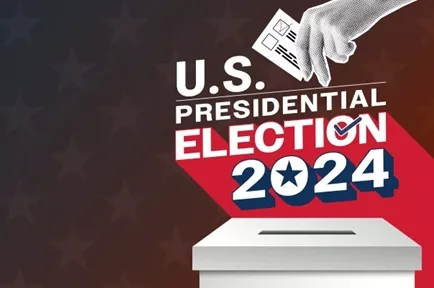Electing a new president of the United States of America is always a momentous occasion in the world, and like so many special events, it makes people want to flex their predictive muscles and figure out what the outcome might be in advance. So, is it any surprise that, like sporting events or the Oscars, you also have the option to bet on the 2024 US presidential election?
Even at this late juncture, it is truly too close to call, and it is no wonder that this year’s contest has been one of the most closely watched. So, is it going to be Kamala Harris or Donald Trump – or perhaps someone else?
The 2024 US presidential election is one of the closest affairs in recent decades. There really is no favorite in the polls and the forecasts, with marginal differences odds-wise and a wide range of potential electoral voting outcomes. This makes this year’s election a genuinely interesting contest to prognosticate and bet on. Here’s everything you need to know about it.
How to bet on politics – tips and tricks to analyze the US presidential elections
How can you bet on the US presidential election?
Donald Trump or Kamala Harris?
The most straightforward way to bet on the US presidential election is to outright predict whether Harris or Trump will be the next president of the United States. It’s as much of a straight shot as it gets from a betting perspective.
Republicans or Democrats? The winning party of the presidential election
Who knows what other twists the 2024 US presidential election has in store? We’ve already seen a momentous shift with Joe Biden’s withdrawal from the race – which means that if you had bet on the sitting president, you would have already lost your wager. Betting on the winning party rather than a specific candidate gives you a bit more wiggle room in terms of shock historic events (say, if one of the VPs ends up getting inaugurated), but this will be reflected in your odds. You also have a cool 1-in-120 chance for an independent candidate winner at the time of writing.
State-by-state winners
Bitsler also offers markets for state-specific wagers, meaning you can predict the winners of individual US states in the presidential election without specifically wagering on who the next president will be. Don’t expect great benefits when it comes to the states that are solidly in the D or the R column – for instance, a Republican win in Utah will net you a whopping 1.005 odds at the time of writing, while a Democrat win in Vermont comes in at 1.002. Still, they are interesting options to spice up a parlay bet if nothing else!
How to analyze and bet on the US election
Political wagers are often very emotional affairs, and it can be easy to misjudge matters or get incorrect information during your research. This is especially true for something as impactful as the election of the next president of the United States. If you’re thinking in terms of predictions and probabilities, clickbait news headlines won’t get you far – you need to find measurements for analysis.
Be careful with partisan analysis
There is always a lot of motivated reasoning going on when reading election coverage and analysis – and it is understandable, as people try to leave their imprint on the future of their country and the elected officials. However, you need to keep a cool head and a clear eye when trying to predict the outcome of an election. It is well known, for instance, that campaigns’ internal polls consistently show better stats for their candidate than what the nonpartisan samples (and the eventual results) end up as, and most leaks and interviews that end up going public are specifically crafted with a narrative in mind.
You will almost never find a Democrat saying that the Republican is running a pretty good campaign and may actually be right on a few salient issues – and vice versa. While this makes sense from a political and emotional standpoint, it means that partisan analysis is functionally useless if you are looking to figure out the correct odds to bet on politics.
Ignore your personal preferences
As a corollary to the above, it is easy to conflate betting on who you want to win the election rather than trying to correctly predict who will win it. It is very similar to betting on your favorite sports team, where it is much easier to cloud your own judgment rather than teams you have a neutral disposition to. It’s also why referees are not allowed to partake in games featuring teams they like – it is all too easy to unintentionally cast your neutrality aside. Some people outright use election betting as a way to hedge against disappointment, purposefully betting on the victory of the candidate they would rather see lose at the ballot box so that they at least have a payday to celebrate even if the country might go in a direction they’ll dislike for the next four years. There can be good reasons to pursue such a strategy, but it is definitely unsound from a betting perspective.
Simply put, if you feel like you have too large of an emotional stake (or real-life consequences) in betting on an election, you might be better off with an activist role instead, or looking into one of the many other markets available on Bitsler for a fun time.
Polls don’t tell the whole story – consider models and added metrics
Polling is as much of a science as it is an art form, and the ever-shifting demographic landscape means that pollsters are often half a step behind. It’s also why there is now a statistics-focused cottage industry of election forecasting models that seek to incorporate a large sampling of polls with additional data to account for potential polling errors – which are almost always part of the eventual outcome.
This isn’t to say pollsters somehow consistently favor one side over the other – their goal is to be as accurate as possible; it’s just that it is a really tough job to model an electorate. In 2016 and 2020, the polls vastly underestimated Donald Trump’s support, but in 2022, they also failed to gauge accurately how strong Democrats’ performances in the midterm elections would be. As is often mentioned in the analysis, a 2022-type error in the current polls would mean that Kamala Harris would easily sweep the swing states and comfortably win the election – but if the numbers are off in the way they were in 2020, then Donald Trump would be the one looking at an easy victory.
Polls, and the underlying numbers, are much more tangible than vibes – but there is also a reason why almost all election prediction models factor in metrics like the state of the economy, looking at fundamental elements to further tweak their forecasts beyond just what a poll aggregation offers.
Another interesting consideration is to check the sentiment on prediction markets and maybe even look for arbitrage options. But you must be savvy – prediction markets are a bit like the stock market, and sentiments can be manipulated by a handful of anonymous whales. Wisdom of the crowds is certainly a thing, but it is not the be-all and end-all when it comes to politics.
Where to follow the US election coverage? Videos and websites
All major news sites, television stations, and web platforms provide round-the-clock coverage of the US presidential election and the tally of the results. While domestic coverage can offer many extra details, the big international sites also have a lot of expertise lined up for a subject matter like this. For a bettor, the live updates and analysis of the developing vote tallies mean that online news coverage is likely the most beneficial – and for large, mostly neutral platforms, you can’t go wrong with the Associated Press and Reuters, whose statistical calls are often taken very seriously by other networks as well when it comes to projecting state winners.
In terms of rigorous analysis and model-based predictions, statistician Nate Silver’s long-running track record of excellence simply cannot be ignored, and his Silver Bulletin newsletter is the spiritual successor to his past efforts at FiveThirtyEight – which, under Disney’s banner and new editorial leadership, still offers a valuable but distinct election model under the 538 branding. Experts also have good things to say about Split Ticket’s extremely detailed analysis and the more polls-focused approach of RealClearPolitics and the Cook Political Report as well.
In general, diving into individual poll results or scouring comment sections on social media is just a good way to raise your blood pressure. If you are serious about betting on the US presidential election, look for statistics, not vibes, just like how you would in the case of any sporting event in search of the best results.
How is the president of the United States elected?
Unlike most democracies, the president of the United States is not elected by popular vote. Instead, it is the Electoral College that ultimately determines the victor. It is an indirect voting method, and it works by tallying up the ballots on a state-by-state basis, with each US state given a number of electors based on their population size.
Each state is a separate winner-take-all affair (except for Maine and Nebraska), and while this election method mostly tracks with the vote winners on a state-by-state basis, it has led to situations in the past where the winner of the national popular vote has not actually ended up as the president in closely contested elections. – looking at you, Al Gore in 2000, or Hillary Clinton in 2016. This means that political campaigns are disincentivized to focus on states where the outcome is obvious – there is no reason for a Democrat to push up their vote share from 70% to 80% in California, just like a Republican has no real strategic reason to try and narrow the margins in Vermont if they otherwise have no chance of winning the state outright.
This is why US election coverage is always all about “battleground states” and the “road to 270” with its iterations through various pathways of the country. (To win the US presidential election, you need to earn the majority of 538 electoral votes – meaning a minimum of 270 in total.) The presidential contenders intensely focus on the handful of states where they both have a realistic chance of victory, and the outcome in these locations is what tends to determine the winner rather than the number of “solid” states with an obvious outcome. This means that campaign strategists in the United States presidential elections need to work with vastly different plans and resource allocation ideas than their European counterparts would.
While the discrepancy between the popular vote winner and the Electoral College winner, plus the relative lack of importance of non-battleground states, have long been contentious elements of the system, it does protect the interest of rural states with smaller populations – and, indeed, it’s been a sound and valid electoral strategy to court their interests in national-level elections.
The election date is November 6, but if the contest turns out to be as close-fought as 2020 was, we will likely not have a final victor declared until mail-in ballots are counted and all potential litigation – think Supreme Court – is sorted out. In terms of formalities, the Electoral College meets in December, and Congress certifies the election victory in January.
Who can become president of the United States in 2024?
There are three constitutional requirements for anyone looking to become the president of the United States. As Article II, Section 1 outlines, you need to be:
- A natural-born citizen, meaning you must either be born on US soil or born to US citizen parents abroad.
- At least 35 years old by the time you take office.
- A resident of the United States for at least 14 years in total, which doesn’t have to be consecutive.
There is one more consideration as of 1951, when a constitutional amendment was passed after Franklin Delano Roosevelt died in office in 1945, shortly after winning his fourth consecutive presidential term. Since then, no president is allowed to serve more than two terms, including more than two years of a term when someone else was elected.
In terms of the 2024 presidential election, the two major party candidates are Donald Trump and Kamala Harris – and under normal circumstances, only they have a realistic chance of becoming president. Small independent third-party candidates like Jill Stein, Cornel West, and Chase Oliver have virtually no chance of winning, but their presence on the ballot in battleground states could have a significant impact in determining the next president by drawing votes away from their supporters – something we have seen examples of in the past.
List of modern US presidential elections and results
Elections can shift and turn on a dime, and the end results in terms of final electoral votes don’t always tell the twists and turns of a hard-fought campaign. For a historical look, here is a complete list of US presidential elections in the modern era in terms of context:
- 2020: Joe Biden (D, 306 electoral votes) defeats Donald Trump (R, 232 electoral votes)
- 2016: Donald Trump (R, 304 electoral votes) defeats Hillary Clinton (D, 227 electoral votes)
- 2012: Barack Obama (D, 332 electoral votes) defeats Mitt Romney (R, 206 electoral votes)
- 2008: Barack Obama (D, 365 electoral votes) defeats John McCain (R, 173 electoral votes)
- 2004: George W. Bush (R, 286 electoral votes) defeats John Kerry (D, 251 electoral votes)
- 2000: George W. Bush (R, 271 electoral votes) defeats Al Gore (D, 266 electoral votes)
- 1996: Bill Clinton (D, 379 electoral votes) defeats Bob Dole (R, 159 electoral votes)
- 1992: Bill Clinton (D, 370 electoral votes) defeats George H.W. Bush (R, 168 electoral votes)
- 1988: George H.W. Bush (R, 426 electoral votes) defeats Michael Dukakis (D, 111 electoral votes)
- 1984: Ronald Reagan (R, 525 electoral votes) defeats Walter Mondale (D, 13 electoral votes)
- 1980: Ronald Reagan (R, 489 electoral votes) defeats Jimmy Carter (D, 49 electoral votes)
- 1976: Jimmy Carter (D, 297 electoral votes) defeats Gerald Ford (R, 240 electoral votes)
- 1972: Richard Nixon (R, 520 electoral votes) defeats George McGovern (D, 17 electoral votes)
- 1968: Richard Nixon (R, 301 electoral votes) defeats Hubert Humphrey (D, 191 electoral votes)
- 1964: Lyndon B. Johnson (D, 486 electoral votes) defeats Barry Goldwater (R, 52 electoral votes)
- 1960: John F. Kennedy (D, 303 electoral votes) defeats Richard Nixon (R, 219 electoral votes)
- 1956: Dwight D. Eisenhower (R, 457 electoral votes) defeats Adlai Stevenson (D, 73 electoral votes)
- 1952: Dwight D. Eisenhower (R, 442 electoral votes) defeats Adlai Stevenson (D, 89 electoral votes)
- 1948: Harry S. Truman (D, 303 electoral votes) defeats Thomas Dewey (R, 189 electoral votes)
- 1944: Franklin D. Roosevelt (D, 432 electoral votes) defeats Thomas Dewey (R, 99 electoral votes)
- 1940: Franklin D. Roosevelt (D, 449 electoral votes) defeats Wendell Willkie (R, 82 electoral votes)
- 1936: Franklin D. Roosevelt (D, 523 electoral votes) defeats Alf Landon (R, 8 electoral votes)
- 1932: Franklin D. Roosevelt (D, 472 electoral votes) defeats Herbert Hoover (R, 59 electoral votes)
- 1928: Herbert Hoover (R, 444 electoral votes) defeats Al Smith (D, 87 electoral votes)
- 1924: Calvin Coolidge (R, 382 electoral votes) defeats John W. Davis (D, 136 electoral votes)
- 1920: Warren G. Harding (R, 404 electoral votes) defeats James M. Cox (D, 127 electoral votes)
- 1916: Woodrow Wilson (D, 277 electoral votes) defeats Charles E. Hughes (R, 254 electoral votes)
- 1912: Woodrow Wilson (D, 435 electoral votes) defeats Theodore Roosevelt (Progressive, 88 electoral votes) and William H. Taft (R, 8 electoral votes)
- 1908: William H. Taft (R, 321 electoral votes) defeats William Jennings Bryan (D, 162 electoral votes)
- 1904: Theodore Roosevelt (R, 336 electoral votes) defeats Alton B. Parker (D, 140 electoral votes)
- 1900: William McKinley (R, 292 electoral votes) defeats William Jennings Bryan (D, 155 electoral votes)
Some quick takeaways to keep in mind from this dataset – since World War 2, most incumbent presidents were able to go on to win a second term, but it’s been exceedingly rare for a party to win three presidential elections in a row. Also, the closer we get to the present, the more close-fought the contests have become in terms of electoral vote totals.
Which are the swing states in the 2024 election?
The battleground states, or swing states, are the handful of competitive (toss-up) states in the nation where there isn’t a solid majority of voters in favor of either candidate. The list of these states tends to shift back and forth over the elections as candidates, policies, and demographics favor different environments and strategies.
There are seven states that seem to be in contention for both campaigns based on the mid-October polling. Here is a complete list of them, with the associated electoral vote totals, the way they voted in recent elections, and what the current polling suggests. There is always the possibility that some other states might turn out to be unexpectedly competitive, too, but that often indicates a more one-sided outcome than what otherwise was expected.
Pennsylvania (19 electoral votes) – Win Pennsylvania, and you most likely win the election. It’s that simple. What makes this a lot less simple is that the polling suggests it’s virtually even between the two candidates in the Keystone State. Should Harris lose, her decision to opt against picking the state’s governor as her running mate will definitely be questioned. In 2020, Democrats won Pennsylvania by 1.2 points, and currently, both senators hailing from the state are Democrats (Bob Casey Jr. and John Fetterman).
Georgia (16 electoral votes) – For a long time, Georgia was a reliably red state on the electoral maps, but its quickly growing and ever-more diverse population has shifted it into battleground territory. The contests were incredibly narrow in 2020, with Biden winning the state by 0.2 points and both Senate races going to runoffs, where Democratic wins conferred them the majority in the upper legislative chamber. At the time of writing, Trump is projected to lead by 2 points despite his consistent feud with the state’s governor.
North Carolina (16 electoral votes) – Another state that you would not normally expect to be in play (with Republicans winning every presidential election since 2012), but the polling has been showing a virtual dead heat this time around, likely due in part to the many scandals dragging down the GOP’s gubernatorial nominee, Mark Robinson. In 2020, Trump won the Tar Heel State by 1.3 points – it’s expected to be a much closer affair this time around. Neither Republican senator (Ted Budd or Thom Tillis) is on the ballot this time around.
Michigan (15 electoral votes) – One of the biggest reasons for Trump’s shock 2016 victory was his overperformance in the Upper Midwest, but he wasn’t able to put up much resistance in Michigan in 2020, with Biden winning by 2.8 points. Democrats have performed strongly in statewide elections since then, but current polling suggests another extremely narrow affair, with Trump taking the slightest of leads and heading into the final stretch of the campaign.
Arizona (11 electoral votes) – Back in the McCain era, Arizona was a solidly red state with a maverick streak – and now, it’s a genuine battleground with real pickup opportunities for Democrats. Harris’ party currently holds one of the senatorial seats with Krysten Sinema moving to an independent status, and the governor, Katie Hobbs, is also Democratic, beating out controversial TV presenter Kari Lake, who is currently running a campaign for Sinema’s Senate seat. It’s a close call all around – in 2020, Biden won by a mere 0.3 points, and now Trump is polling at an approximate +2 lead – but the legislative races, including a ballot measure aiming to codify the right to abortion in Arizona, may boost Democratic turnout.
Wisconsin (10 electoral votes) – Before Trump made himself a fixture in modern US politics, the Badger State was a reliably Democratic vote going all the way back to World War 2, but his narrow win in 2016 played a key part in his successful electoral campaign – and his narrow defeat in 2020 did the same to his defeat. The state is as close to a toss-up as it gets when it comes to 2024.
Nevada (6 electoral votes) – The home of Las Vegas is a bit of a special case, as it has more registered nonpartisan voters than Democrats or Republicans, and while historically, Democrats have had an edge here (in no small part due to the late Harry Reid’s vaunted turnout machine), it is shaping up to be another incredibly close affair despite Biden’s +2.4 point win back in 2020.
With approximately 226 electoral votes in the “solidly Democratic” column and 230 in the “solidly Republican” one, around 40-50 electoral votes’ worth of state wins should put either candidate over the vaunted 270 line.
Why is the 2024 US presidential election worth betting on?
This year’s race for the US presidency is full of unique circumstances, which is why it has attracted so much attention from prognosticators and bettors alike. While choosing the leader of the free world is always a consequential affair, there have been many incredible twists and turns in the 2024 presidential campaign that make it a truly standout affair from a political and betting perspective alike.
The sitting president is not running (anymore)
Joe Biden, the winner of the 2020 election, was eligible to run in 2024, and indeed he did so, despite widespread concerns about his age and approval ratings. Shortly before the Democratic National Convention, where the party officially selected its nominee, he was forced to change his mind and endorsed his vice president, Kamala Harris.
The last time a sitting president decided to withdraw mid-campaign was Lyndon B. Johnson back in 1968, on a similar account of poor polling and growing global issues. We have also seen cases where an otherwise eligible president opted against running (Truman in 1952), but this is by far the latest case when the deck has been shuffled nominee-wise, forcing Harris to build a campaign operation on the fly at an extremely rapid clip in terms of usual US presidential election politics, where the run-up to the general election is generally measured in years, not months.
It’s also a unique time in global politics, as we have seen all over the world that the usual “incumbency advantage” conferred on sitting presidents and prime ministers has been nullified, if not reversed, as the governments that stumbled through COVID and the difficult economic and geopolitical situation that followed have all been heavily punished by voters. Canada, the UK, France, Germany – the list could go on. It’s another unusual circumstance to factor into any US presidential election betting decision you might choose to make.
The Donald Trump phenomenon: repeat run, assassination attempts, the age question
No matter what your opinion is about Donald Trump, it is clear that he is a phenomenon in US politics. He is the first person to become president without ever holding elected office before, and the first president since Grover Cleveland 1892(!) to potentially serve non-consecutive presidential terms. He is also a convicted felon, and with Joe Biden’s exit from the race, the oldest major-party candidate in US election history. Trump is an incredibly polarizing figure with near-unparalleled staying power in modern American politics.
Also, no matter what your opinion is about Donald Trump, you probably have one – and you are most definitely not alone. In most presidential elections, a big part of the opposing campaign is to “define” their rival, meaning they try to introduce them to the wider electorate in an unfavorable light to color their perception of them. (Yes, as odd as this may sound, most regular Americans don’t know their presidential candidates particularly well heading into the election! Not everyone is a politics junkie – in fact, most people aren’t.)
In the case of Trump, this is not really a factor in the 2024 race, as people have mostly made their minds up about the man. If you accept this view, then it logically follows that this is a turnout election, not one about persuasion – though you’d be surprised to note that while Trump’s favorability ratings are still underwater, they are much higher than they have been at this point in 2016 and 2020. The failed assassination attempts – a reminder of the long-running dark shadow of American presidential politics – no doubt also played a part in this, and they have served as a bloodcurdling reminder of just how a thin line US presidential elections are in so many respects.
Kamala Harris has a chance to make history
While Donald Trump tends to be the presidential candidate who dominates the headlines, it’s worth making a note of Kamala Harris’ potentially history-making candidacy as well. While she hasn’t made it a key plank of her campaign in the way Hillary Clinton did in 2016, she would be the first female president in US history should she emerge as the victor on November 6, and as a daughter of immigrants with a multiracial identity, she has already reached milestones as a VP pick.
From a political perspective, the dramatic nature of Joe Biden’s late exit from the race, coupled with the general dissatisfaction with incumbents, makes her campaign a fascinating case study to follow. It is also an interesting tightrope walk in terms of continuity – while she is a senior part of the Biden administration, Harris continues to present herself as the underdog and the change candidate in the 2024 US presidential election. Regardless of the final outcome, it is an interesting playbook to be sure.























